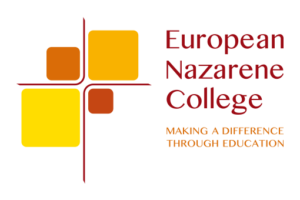Dear Friends of EuNC,
“Enabling Christlike Disciples for Ministry” has been our mission as a school for a long time. We are not only following the mission of our church, but the instructions Jesus gave His disciples before He ascended to His father: “Therefore go and make disciples of all nations, baptizing them in the name of the Father and of the Son and of the Holy Spirit, and teaching them to obey everything I have commanded you” (Mat 28:19-20a). In the past months, this has happened through various graduations. We celebrate with our students and are thankful for God’s blessings on their lives. We also want to look back at what God has done in and through our college within the past decade and beyond. The recently published book “EuNC On Mission” gives you more insight into His work. Through “Club 55” you can give us more insight into how His kingdom, EuNC and your stories are connected. It is our prayer that you will experience His presence in your future steps, as He promised: “Surely I am with you always, to the very end of the age” (28:20b).
Dennis Lieske (Editor)
Graduation in Hungary
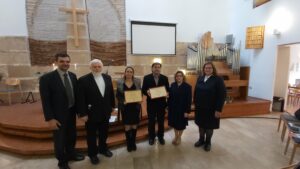
On the 27th February, two students graduated in the Hungary Learning Centre. Due to the pandemic, the presential events are few and far between. However, the United Methodist Church had a conference to which EuNC was invited to hold a one-hour graduation celebration and also present the school and its programs.
As we worshipped together, we celebrated the achievements of the students who worked hard and with diligence in spite of many life challenges. Hungary LC Coordinator Rev. Gábor Szuhánszky also thanked the work of the faculty members and the Wesleyan Theology
Alliance. The chairman of the Alliance, Dr. Khaled, also gave a short report and thanked EuNC ‘s general and local leadership for the work.
It was uplifting to hear the testimonials of both the graduating students in person, a current student and alumni . Among the hybrid conference participants, we had 23 EuNC faculty, students and alumni present.
“I am grateful for the school and to my church and bishop for their support and making it possible to hold my certificate in my hands”,
said Blanka, she and her husband are from the Roma community and work in their Abony community. The graduation and interviews were also broadcasted by one of the nationwide television channels.
Major Vecseyné Fulmer Enikő
(Hungary LC Administrator)
ENF Graduations
In March 2021, a large group of EuNC students from Eurasia North Field (ENF) had their graduations that took place at various District Assemblies:
- 20 March: Central Asia District Assembly in Nur-Sultan and the LC graduation ceremony with 9 graduates
- 27 March: Russia South District Assembly in Volgorad and
Russia North District Assembly in Moscow with 3 graduates.
Two people graduated with Certificates of Spiritual Formation and six people with Diplomas in Christian Ministry. We are particularly proud of the fact that three DCM students graduated with honours. In spite of the fact that many participants could not travel to be present at these graduations in person, the use of Zoom allowed everybody to join in and share in the joy of the graduates and their families. Rector Rev. Mária Gusztinné Tulipán addressed the graduates and presented them with certificates and diplomas. Some of the EuNC faculty were also able to join the graduations via Zoom which added a special touch to the celebration.
EuNC In The Region
In addition to the mentioned events EuNC was also virtually represented at the following District Assemblies:
- 17 March: Armenia District Assembly in Yerevan
- 31 March: Ukraine-Moldova District Assembly in Kyiv.
Faculty News
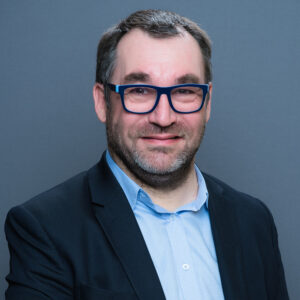
We are always thankful for support on our EuNC Team. Philippe Batreau, also secretary of the Board of Trustees, has recently started serving as France LC Administrator. We are grateful for his various ministries and are looking forward to working with him.
EuNC On Mission
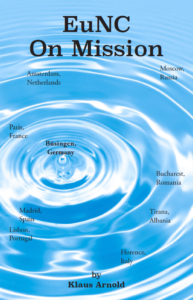
Do you want to know more about EuNC? Are you interested in our most recent history? Then you might want to have a look at „EuNC On Mission“, an NMI Mission book, written by our former Rector Rev. Dr. Klaus Arnold and recently published. You can find an online version right here.
Book Review
I have known Wolfgang Köhler for many years as administrator, teacher, and scholar. But here I want to commend his contribution as a scholar. Wolfgang spent years researching the ideas of obduracy in the book of Isaiah, especially chapter 6. The successful defense of his thesis and its recent 2019 publication under the title, Die Verstockung Israels im Jesajabuch – Studie eines theologischen Motivs, in Bibelstudien 25. Münster: LIT Verlag, marked the culmination of his hard work. I was privileged to read portions of this research before it was submitted for the defense, as well as when it was released. Wolfgang builds his examination on a very detailed and in-depth engagement with scholarship, particularly German specialists. He is very thorough in his exegesis and explains the presence of heart-hardness in Isaiah 6 as part of Isaiah’s overall salvation history concept. In addition, he draws some helpful implications of how this concept of obduracy was picked up in the Gospels and Paul. I recommended Wolfgang’s monograph for reviewing in the European Journal of Theology and asked my colleague, Dr. Samuel Hildebrandt, a specialist in the Old Testament, to evaluate this piece. While the review in the EJT is still to come, it is my pleasure to share Hildebrandt’s complementary review on Wolfgang’s publication here.
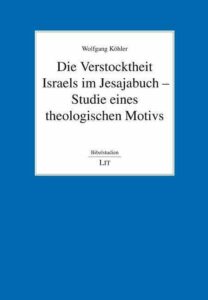
From its first interpreters to the present day, Isaiah’s instruction to harden the hearts of his hearers unto destruction has been a theological conundrum: what does this strange command to the prophet suggest about God’s character, the redemption of God’s people, and the purpose of proclamation? Although Isa 6.9-10 has been the object of much scholarly debate, Köhler’s revised doctoral work (Universität Heidelberg, 2018) makes a fresh exegetical and theological contribution. The premise for his study is surprisingly simple: the question of hardened hearts is not only raised in Isa 6.9-10 but in many other sections in the book. We are not dealing with a singular, bewildering scene, but with a motive that develops across Isaiah and that needs to be considered as a whole.
Köhler devotes the first three chapters to matters of terminology (pp. 5-9), the motive of Verstockung in Jeremiah, Deuteronomy, and Exodus (pp. 9-20), and a well-balanced review of previous research (pp. 21-44; esp. Hesse, Evans, Uhlig). In preparation for his combined effort of synchronic and diachronic analysis, Köhler enters in ch. 4 into the long-standing discussion about Isaiah’s redaction (pp. 45-60). Thus, the stage is set for the main part of the dissertation: the translation and exegesis of Isa 1.2-9, 6.1-13, 8.11-20, 29.9-24, 32.1-8, 35.1-10, 40.1-11, 42.18-25, 55.6-13, 57.14-19, 59.1-21, and 63.7-64.11. The textual analysis and theological reflections are compelling and offer fresh insights, for instance, about (i) the way in which Isa 1 initiates the motive of obduracy in the book, (ii) the lively discourse around the agency of God and Israel in Isa 29 and 42, and (iii) the ongoing relevance of the motive in post-exilic times. In view of the latter, it is fitting that the volume ends with a short discussion on how Isa 6 is cited and applied by the New Testament authors (pp. 265-74).
Köhler has taken the scholarship on Isa 6 a significant step forward by drawing our attention afresh to the depth of Isaiah’s vision. The question of obduracy indeed stands on a broader horizon than Isa 6.9-10. The prophetic book itself wrestles with the complexity of the agency, purpose, and duration of Israel’s hard hearts and Köhler succeeds in taken his readers along this journey.
Dr. Svetlana Khobnya
A Word from the Rector
Connectedness. It is inspiring, energizing and wonderful to be part of the life of the church. From Budapest to Yerevan to Nur-Sultan to Moscow to Volgograd to Kyiv (without flying). I am deeply thankful and blessed to have visited the District Assembly and the LC graduation ceremony of the Russia South, Russia North, Central Asia, a Methodist conference and graduation ceremony of the Hungary LC, and the District Assembly of the Armenia and the Ukraine-Moldova Districts. We proudly and with love congratulate our 15 graduates!
Rector Mária Gusztinné Tulipán
